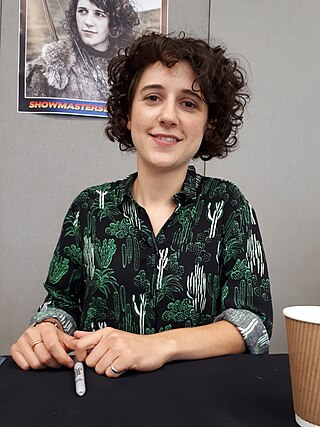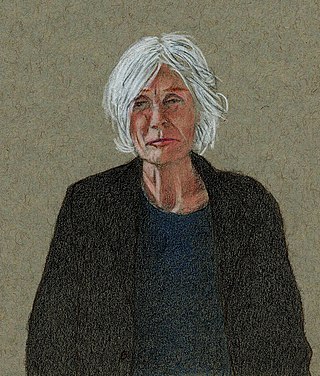Related Research Articles

The play 2071 is a "dramatised lecture" written by Chris Rapley, a climate scientist, and playwright Duncan MacMillan. It was first performed in 2014 at the Royal Court Theatre in London.

Top Girls is a 1982 play by Caryl Churchill. It centres on Marlene, a career-driven woman who is heavily invested in women's success in business. The play examines the roles available to women in old society, and what it means or takes for a woman to succeed. It also dwells heavily on the cost of ambition and the influence of Thatcherite politics on feminism.
A Number is a 2002 play by British playwright Caryl Churchill. The story, set in the near future, is structured around the conflict between a father (Salter) and his sons – two of whom are clones of the first one. The play addresses the subject of human cloning and identity, especially nature versus nurture. Many critics over the years have lauded A Number, arguing Churchill created a work of significant intellectual depth with effective economy of style.
In-yer-face theatre is a term used to describe a confrontational style and sensibility of drama that emerged in Great Britain in the 1990s. This term was borrowed by British theatre critic Aleks Sierz as the title of his book, In-Yer-Face Theatre: British Drama Today, first published by Faber and Faber in March 2001.
Far Away is a 2000 play by British playwright Caryl Churchill. It has four characters, Harper, Young Joan, Joan, and Todd, and is based on the premise of a world in which everything in nature is at war. It is published by Nick Hern Books. While some critics have expressed reservations about the play's ending, many regard Far Away as one of Churchill's finest plays.
Anthony Neilson is a Scottish playwright and director. He is known for his collaborative way of writing and workshopping his plays. Much of his work is characterised by the exploration of sex and violence.

Jonathan Cullen is a British actor of stage, film and television.
Alex Price is a British actor who has appeared in various television programmes including Being Human, Merlin and Doctor Who. He starred in feature-length films, such as A Horse with No Name, and in a variety of short films.
Drunk Enough to Say I Love You? is a 2006 political play with eight scenes by Caryl Churchill. It addresses the application of power by the United States mostly since the Vietnam War. Critics' responses to the play are divided.

Eleanor Lucy V. Kendrick is an English actress best known for playing Anne Frank in the BBC's 2009 miniseries The Diary of Anne Frank, Ivy Morris in the first series of the 2010 revived Upstairs Downstairs, and Meera Reed in the HBO series Game of Thrones. She also voices Taelia Fordragon in World of Warcraft: Battle for Azeroth.
Ryan Craig is a British playwright, whose plays usually probe both social norms and ethical issues. He is also a writer for screen, television and radio.
Blue Heart is a series of two one-act plays, written by Caryl Churchill and copyrighted in 1997. The first play, Heart’s Desire, is about a family waiting on the arrival of their daughter Suzy. The second play, Blue Kettle, is about a man named Derek who goes around telling women that they are his mother, claiming he was adopted at birth; the women believe him and find ways to confirm that he is indeed their son. As the interactions between Derek and the women move forward, the words "blue" and "kettle" are inserted into the dialogue with increasing frequency, seemingly at random. Blue Heart is highly regarded by critics.

Caryl Lesley Churchill is a British playwright known for dramatising the abuses of power, for her use of non-naturalistic techniques, and for her exploration of sexual politics and feminist themes. Celebrated for works such as Cloud 9 (1979), Top Girls (1982), Serious Money (1987), Blue Heart (1997), Far Away (2000), and A Number (2002), she has been described as "one of Britain's greatest poets and innovators for the contemporary stage". In a 2011 dramatists' poll by The Village Voice, six out of the 20 polled writers listed Churchill as the greatest living playwright.
Love and Information is a play written by the British playwright Caryl Churchill. It first opened at the Royal Court Theatre in September 2012. It received many positive reviews from critics.
James Macdonald is a British theatre and film director who is best known for his work with contemporary writers such as Caryl Churchill. He was associate and deputy director of the Royal Court Theatre from 1992 to 2006. There he staged the premiere of Sarah Kane's Blasted (1995), her highly controversial debut which sparked a Newsnight debate on BBC Television. He also directed the premiere of Kane's Cleansed (1998) and 4.48 Psychosis which opened after her suicide.

Shivered is a two act play by Philip Ridley. His ninth stage play for adults, it premiered in 2012 at the Southwark Playhouse.
Fen is a 1983 play by Caryl Churchill. While not as well known as Churchill works like Cloud 9 (1979) and Top Girls (1982), it has been praised by many critics.
Here We Go is a 2015 play by Caryl Churchill. Critics' reviews were generally positive.
Escaped Alone is a 2016 play by Caryl Churchill. Critics' reviews were mostly positive.
Anatomy of a Suicide is a 2017 play by Alice Birch. It won the 2018 Susan Smith Blackburn Prize.
References
- ↑ Marlowe, Sam (26 September 2019). "Glass. Kill. Bluebeard. Imp. review — compassionate tales of survival". The Times. ISSN 0140-0460 . Retrieved 7 June 2020.
- ↑ Sierz, Aleks (27 September 2019). "Glass. Kill. Bluebeard. Imp., Royal Court review - still experimental after all these years". The Arts Desk. Retrieved 7 June 2020.
- ↑ Benedict, David (26 September 2019). "Glass. Kill. Bluebeard. Imp review, Royal Court, London, 2019". The Stage. Retrieved 7 June 2020.
- ↑ Thompson, Jessie (26 September 2019). "Glass. Kill. Bluebeard. Imp. review: Caryl Churchill's thrilling box of tricks". Evening Standard. Retrieved 7 June 2020.
- ↑ Billington, Michael (25 September 2019). "Glass. Kill. Bluebeard. Imp. review – Caryl Churchill's compelling quartet". The Guardian. ISSN 0261-3077 . Retrieved 8 June 2020.
- ↑ Taylor, Paul (26 September 2019). "Glass. Kill. Bluebeard. Imp review: Caryl Churchill play about the Weinstein scandal is haunting and audacious". The Independent. Retrieved 8 June 2020.
- ↑ Lukowski, Andrzej (26 September 2019). "'Glass. Kill. Bluebeard. Imp.' review | Theatre in London". Time Out London. Retrieved 8 June 2020.
- ↑ Waugh, Rosemary (27 September 2019). "Caryl Churchill's Glass. Kill. Bluebeard. Imp. – intruiging, brilliantly performed plays". New Statesman. Retrieved 8 June 2020.
- ↑ Clapp, Susannah (29 September 2019). "The week in theatre: Glass. Kill. Bluebeard. Imp; My Beautiful Laundrette – review". The Observer. ISSN 0029-7712 . Retrieved 8 June 2020.
- ↑ Greenstreet, Hannah (30 September 2019). "Review: Glass. Kill. Bluebeard. Imp. at Royal Court". Exeunt Magazine. Retrieved 8 June 2020.
- ↑ Cavendish, Dominic (26 September 2019). "Glass. Kill. Bluebeard. Imp. Royal Court, review: not quite the play we need from theatre's elder stateswoman". The Telegraph. ISSN 0307-1235 . Retrieved 7 June 2020.
- ↑ Evans, Lloyd (5 October 2019). "Flimsy and pretentious sketches: Caryl Churchill's Glass. Kill. Bluebeard. Imp. reviewed". The Spectator. Retrieved 8 June 2020.